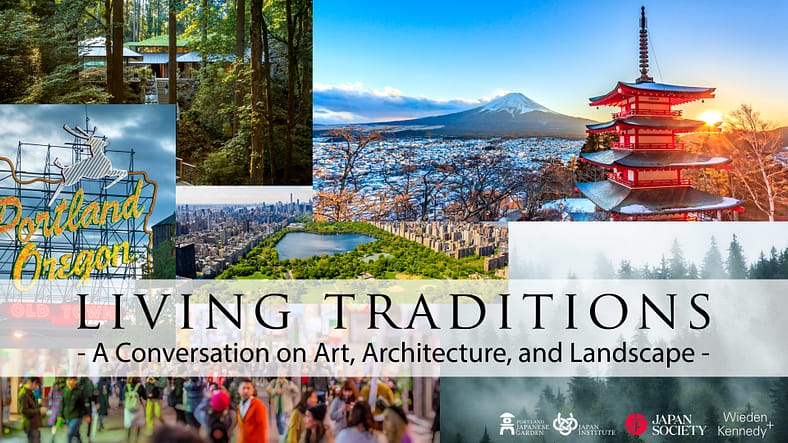
Event Info
Date: Saturday, February 3, 2024
Time: Door opens 3 pm, Program 3:30 – 5:00 pm PST
Venue: Wieden+Kennedy Portland Atrium (224 NW 13th Ave Portland, OR 97209)
Capacity: 200 seats
Join Japan Institute of Portland Japanese Garden at the iconic Portland advertising agency, Wieden+Kennedy, for the first ever in-person installment of Living Traditions, a series of conversations and talks that explore some of the most iconic facets of Japanese culture.
“A Conversation on Art, Architecture, and Landscape” will explore the future of urban environments and the evolving roles of creative institutions to inspire civic discourse. Keynote speaker Yuko Hasegawa, Japan’s foremost contemporary art curator, will expound on her vision for integrating environmental awareness and ecology into exhibitions and innovative public programming. Joining Hasegawa in this forum will be a panel discussion featuring luminary speakers including architect Shohei Shigematsu (Director of OMA NYC) and landscape architect Dorothée Imbert (Director of the Knowlton School of Architecture, The Ohio State University). Professor Ken Tadashi Oshima (Professor of architecture, University of Washington, Seattle) will moderate this dialogue on how architecture, land use, and agriculture can foster creative placemaking and environmental sustainability.
Registration Info
This is a free event that requires registration.
Registration ClosedJoin Waitlist
Program (All times PST)
3:00 pm: Doors open
3:30 pm: Opening Remarks
3:45 pm: Keynote speech Yuko Hasegawa, Director, 21st Century Museum of Contemporary Art, Kanazawa
4:10 pm: Intro to Panel Discussion
- Presentation by Shohei Shigematsu, Architect / OMA Partner and Director of OMA New York
- Presentation by Dorothée Imbert, Landscape Architect / Director of the Knowlton School of Architecture, The Ohio State University
4:30 pm: Panel Discussion
- Yuko Hasegawa x Shohei Shigematsu x Dorothée Imbert
- Moderator: Ken Tadashi Oshima, Professor of Architecture, University of Washington
5:00 pm: End of the program
A networking reception immediately follows the forum. All forum attendees are invited.
About Living Traditions
Many of today’s most popular trends are rooted in Japanese traditions going back centuries, such as Zen spiritual practices, innovative textile working, attention to seasonality, and sustainability practices. Since 2020, the Living Traditions series has revealed the historic trajectories of Japanese culture. These single-topic virtual discussions have covered multiple disciplines and featured thought-provoking conversations between experts and cultural stewards on how they maintain deep-rooted traditions in the present day. In 2024, for the first time, Living Traditions will feature an in-person creative forum, inviting trailblazers in architecture, landscape design, and the arts to a discussion about the latest developments between these creative fields and environmental sustainability.
Living Traditions is presented by Japan Institute of Portland Japanese Garden in partnership with Japan Society (NY) and Wieden+Kennedy. The series is supported by the Government of Japan.
Previous online program recordings are available for viewing.
More information about Japan Society’s iteration of Living Tradition 2024 is available.



About the Speakers


Shohei Shigematsu is a partner at OMA, an international architecture firm. Shigematsu leads OMA’s diverse portfolio in the Americas and Japan. He is responsible for delivering a number of projects across North America, including Milstein Hall for the Cornell University College of Architecture, Art and Planning; a new building for the Musée national des beaux-arts du Québec; the Faena Forum in Miami Beach; Sotheby’s headquarters in New York; the Audrey Irmas Pavilion for the Wilshire Boulevard Temple in Los Angeles; and a holistic campus renovation and new building for the Buffalo AKG Art Museum, New York.
His expansion to the New Museum in New York City is currently under construction. In addition to buildings for museums and institutions, Shigematsu has collaborated with artists such as Cai Guo-Qiang and Marina Abramović, and fashion brands such as Dior, Tiffany & Co., and Prada on exhibition designs, retail flagships, and branding strategies. He is also a professor at Kyushu University of Human Environment Studies and Director of BeCAT (Built Environment Center with Art & Technology).

